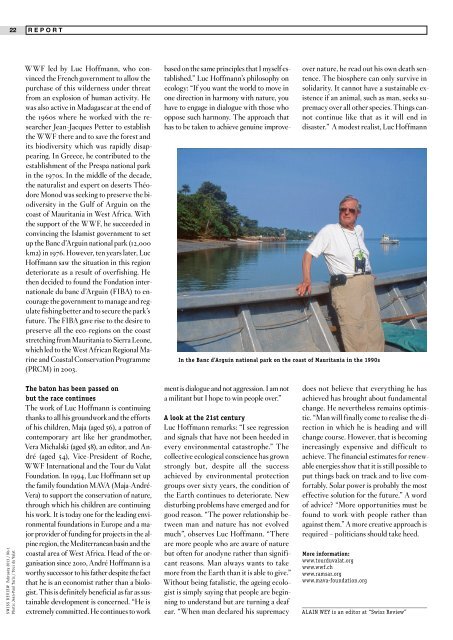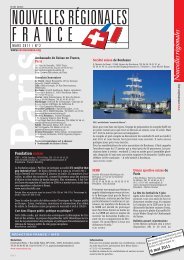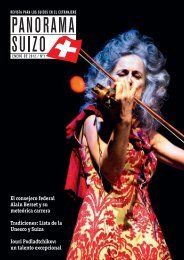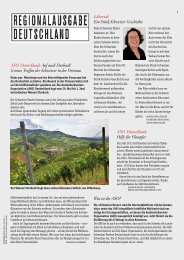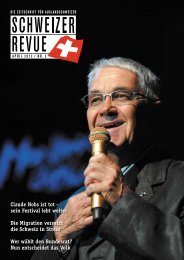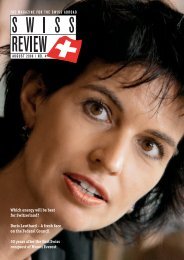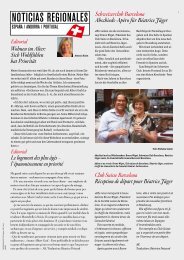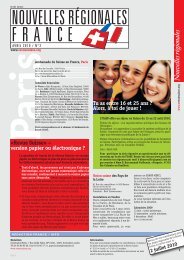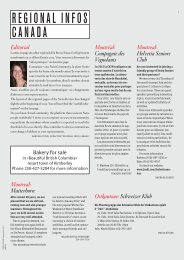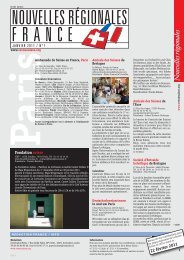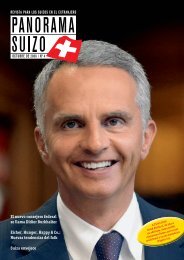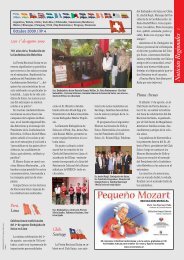Download PDF Swiss Review 1/2013 High Resolution
Download PDF Swiss Review 1/2013 High Resolution
Download PDF Swiss Review 1/2013 High Resolution
Create successful ePaper yourself
Turn your PDF publications into a flip-book with our unique Google optimized e-Paper software.
22 Report<br />
WWF led by Luc Hoffmann, who convinced<br />
the French government to allow the<br />
purchase of this wilderness under threat<br />
from an explosion of human activity. He<br />
was also active in Madagascar at the end of<br />
the 1960s where he worked with the researcher<br />
Jean-Jacques Petter to establish<br />
the WWF there and to save the forest and<br />
its biodiversity which was rapidly disappearing.<br />
In Greece, he contributed to the<br />
establishment of the Prespa national park<br />
in the 1970s. In the middle of the decade,<br />
the naturalist and expert on deserts Théodore<br />
Monod was seeking to preserve the biodiversity<br />
in the Gulf of Arguin on the<br />
coast of Mauritania in West Africa. With<br />
the support of the WWF, he succeeded in<br />
convincing the Islamist government to set<br />
up the Banc d’Arguin national park (12,000<br />
km2) in 1976. However, ten years later, Luc<br />
Hoffmann saw the situation in this region<br />
deteriorate as a result of overfishing. He<br />
then decided to found the Fondation internationale<br />
du banc d’Arguin (FIBA) to encourage<br />
the government to manage and regulate<br />
fishing better and to secure the park’s<br />
future. The FIBA gave rise to the desire to<br />
preserve all the eco-regions on the coast<br />
stretching from Mauritania to Sierra Leone,<br />
which led to the West African Regional Marine<br />
and Coastal Conservation Programme<br />
(PRCM) in 2003.<br />
based on the same principles that I myself established.”<br />
Luc Hoffmann’s philosophy on<br />
ecology: “If you want the world to move in<br />
one direction in harmony with nature, you<br />
have to engage in dialogue with those who<br />
oppose such harmony. The approach that<br />
has to be taken to achieve genuine improve-<br />
over nature, he read out his own death sentence.<br />
The biosphere can only survive in<br />
solidarity. It cannot have a sustainable existence<br />
if an animal, such as man, seeks supremacy<br />
over all other species. Things cannot<br />
continue like that as it will end in<br />
disaster.” A modest realist, Luc Hoffmann<br />
In the Banc d’Arguin national park on the coast of Mauritania in the 1990s<br />
<strong>Swiss</strong> <strong>Review</strong> February <strong>2013</strong> / No. 1<br />
Photo: Jean-Paul Taris / Tour du Valat<br />
The baton has been passed on<br />
but the race continues<br />
The work of Luc Hoffmann is continuing<br />
thanks to all his groundwork and the efforts<br />
of his children, Maja (aged 56), a patron of<br />
contemporary art like her grandmother,<br />
Vera Michalski (aged 58), an editor, and André<br />
(aged 54), Vice-President of Roche,<br />
WWF International and the Tour du Valat<br />
Foundation. In 1994, Luc Hoffmann set up<br />
the family foundation MAVA (Maja-André-<br />
Vera) to support the conservation of nature,<br />
through which his children are continuing<br />
his work. It is today one for the leading environmental<br />
foundations in Europe and a major<br />
provider of funding for projects in the alpine<br />
region, the Mediterranean basin and the<br />
coastal area of West Africa. Head of the organisation<br />
since 2010, André Hoffmann is a<br />
worthy successor to his father despite the fact<br />
that he is an economist rather than a biologist.<br />
This is definitely beneficial as far as sustainable<br />
development is concerned. “He is<br />
extremely committed. He continues to work<br />
ment is dialogue and not aggression. I am not<br />
a militant but I hope to win people over.”<br />
A look at the 21st century<br />
Luc Hoffmann remarks: “I see regression<br />
and signals that have not been heeded in<br />
every environmental catastrophe.” The<br />
collective ecological conscience has grown<br />
strongly but, despite all the success<br />
achieved by environmental protection<br />
groups over sixty years, the condition of<br />
the Earth continues to deteriorate. New<br />
disturbing problems have emerged and for<br />
good reason. “The power relationship between<br />
man and nature has not evolved<br />
much”, observes Luc Hoffmann. “There<br />
are more people who are aware of nature<br />
but often for anodyne rather than significant<br />
reasons. Man always wants to take<br />
more from the Earth than it is able to give.”<br />
Without being fatalistic, the ageing ecologist<br />
is simply saying that people are beginning<br />
to understand but are turning a deaf<br />
ear. “When man declared his supremacy<br />
does not believe that everything he has<br />
achieved has brought about fundamental<br />
change. He nevertheless remains optimistic.<br />
“Man will finally come to realise the direction<br />
in which he is heading and will<br />
change course. However, that is becoming<br />
increasingly expensive and difficult to<br />
achieve. The financial estimates for renewable<br />
energies show that it is still possible to<br />
put things back on track and to live comfortably.<br />
Solar power is probably the most<br />
effective solution for the future.” A word<br />
of advice? “More opportunities must be<br />
found to work with people rather than<br />
against them.” A more creative approach is<br />
required – politicians should take heed.<br />
More information:<br />
www.tourduvalat.org<br />
www.wwf.ch<br />
www.ramsar.org<br />
www.mava-foundation.org<br />
Alain Wey is an editor at “<strong>Swiss</strong> <strong>Review</strong>”


